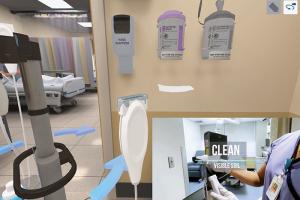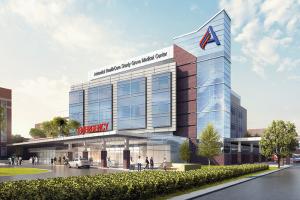Hologram doctor makes house calls
This year's 9th Annual University of Southern California (USC) Body Computing Conference opened with a video of a doctor talking to a patient. That act in and of itself is nothing remarkable until you realize that while the patient is being filmed in one location in Dubai, the doctor is beamed in as a hologram all the way from the United States. The doctor on the video is cardiologist Leslie Saxon, executive director and founder of the USC Center for Body Computing. She calls the presentation a hologram house call.
"In the last nine years, there has been a revolutionary change in the way culture and society use technology," Saxon says. "It's about to happen in medicine."
Saxon's demonstration of the technology is part of a larger program called the Virtual Care Clinic. In collaboration with several technology partners and the USC Institute for Creative Technologies, the center is a first-of-its-kind virtual hospital with patients' health data being fed via wearable and injectable technology.
The clinic will launch with a focus on chronically ill patients, veterans returning from war, elite athletes and patients who want to be more engaged with their own health care.
And the hologram house calls will allow physicians to visit patients anywhere in the world. For those living in rural areas or traveling to remote places without access to specialists, this could be a godsend.
"This will be a clinic where patients can see the future," Saxon says. "A clinic where the best doctor is always in."
The clinic also will help veterans combating post-traumatic stress disorder through a technology called virtual reality exposure therapy. The center also has developed a virtual doctor app that features avatars of the clinic's physicians who interview patients on smartphones, asking them to enter various data such as age, medical condition and diseases that run in their families. The app then provides information on treatments tailored to each patient.
Saxon says the technologies displayed at the conference can help to streamline doctor visits and allow medical staff to see many more patients in a day.
"Technology has introduced a new era in medicine and especially in the role patients can and should play in their own health stories," she says. "Being able to scale medical research to include potentially hundreds of thousands of participants via mobile smartphone and app technology or see 100 patients daily instead of just 20 via a virtual care clinic concept not only gives physicians more insights and, therefore, more efficiency in treating and diagnosing, but also gives patients more personalized information about their specific health needs."




